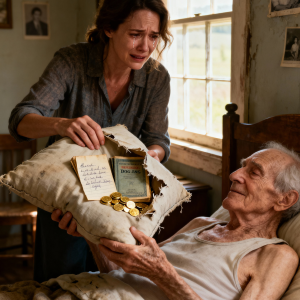
The winter of 1882 struck early in the secluded Montclair Ranges, where snow clung to the ridges before autumn had truly ended. In a cabin built against a shoulder of rock lived Rowan Hale, a thirty-two-year-old man who had once traded livestock and served as an interpreter between settlers and Comanche. Years of violence had driven him into solitude: women screaming in ambushes, children carried off, old men left to freeze. No one had listened when he spoke of mercy, so he chose silence instead. For six years he had spoken mostly to his goats and to the forest wind.
On a pale afternoon Rowan was splitting logs. His gloves were stiff, his boots worn, but the stove inside glowed and a pot of rabbit stew sent a faint aroma into the air. Suddenly the steady hush of snow broke under the weight of human footsteps. He set down the axe, moved to the porch with his revolver close at hand, and waited.
Five women stood at the edge of the clearing. Their clothes were torn, their feet raw with frost, their blankets threadbare. The eldest lifted her head. She spoke with a cracked but steady voice: “We need shelter for one night.”
Rowan’s eyes traveled over them. A girl no older than sixteen bled from a cut on her leg. Another clutched an arm that had slipped out of place. They carried only one satchel. Rowan thought of the last man he had taken in, a trapper who stole from him and tied him in his own barn. These were not thieves. They were widows of the Arapaho, proud but exhausted. He pushed open the gate without answering.

Inside, the women crouched near the fire as he stirred the stew and passed them bowls. Their silence was heavy but not hostile. The eldest, whose name was Idris, stretched her palms toward the flames. A wound across her shoulder showed through her torn dress, poorly healed and angry. Rowan felt not desire but fury at whoever had done this.
The youngest, Seren, trembled as she ate, yet did not cry. After the meal he handed them wool blankets and set spare cots near the stove. He asked no questions. Idris studied him across the fire, her dark eyes alert, as if measuring whether the man with a rifle across his knees could be trusted.
That night Rowan did not close his eyes. He sat in his chair by the window, listening to the fire crackle and the women whisper in a tongue half-familiar to him. He did not feel threatened, only responsible.
At dawn he brewed coffee. Idris watched quietly before the others stirred. They did not prepare to leave. Instead they mended their clothing, carried water, and checked the goat pen. Rowan saw they moved with the discipline of those who had lost too much already.
Later Idris explained in low words. They had lived near Fort Carden, until drunken ranchers raided their lodge, claiming they hid warriors. The men set fire to everything. The women fled with nothing but blankets and walked five days through snow. Rowan pointed out a path toward Greystone on the map. Idris shook her head. “Seren cannot walk further,” she said. Rowan gave her salve. When she tried to promise work in exchange he answered, “I am not asking for you. It is for her.” Something softened between them after that.
Days lengthened. Idris stood beside Rowan while he chopped wood, slow but determined though the wound pulled at her side. Inside, Maura and Fionn cooked stew in silence while Eira hung herbs to dry. Rowan began to wonder if his cabin had always been waiting for this bustle.
One evening Idris said quietly, “I know what men expect when women are stranded. I know what people will whisper if we remain.” Rowan said nothing. She seemed to read his silence. That night she leaned close and kissed him with the calm of one who has chosen. They lay together by the fire, not rushed, not ashamed, only warmed by one another’s skin.
The snow thickened outside, but inside a rhythm formed. Work, warmth, sleep. Seren’s wound began to heal, laughter flickered back into the room, and Rowan found himself smiling without realizing it. He no longer flinched when touched.
Rumor eventually reached the post office in Calderon Valley that Rowan Hale was harboring five Arapaho widows. Some called it scandal, others pity. When the clerk rode up in spring, he found the papers signed, the women registered as lawful workers on the homestead. There was nothing to contest.
One evening Rowan stepped behind the cabin where Idris was rinsing clothes. He said, “I want to ask you something.”
She answered with a small smile, “You cannot ask me to leave.”
“I want you to marry me,” he replied.
She studied him. “Is this for the law?”
“No. Because when I think of ten winters from now, I want to wake beside you. I want this field, this cabin, this life.”

Idris pressed her forehead against his chest. “I never thought I would belong again. But I choose you.”
They married beneath a pine tree, with no priest and no audience. Rowan spoke, “You stay with me, and I stay with you.” Idris replied, “Then we stay.”
Summer brought green shoots and clear water. Seren carved a wind chime of bone and hung it by the door. Maura planted beans along the shed. Eira sketched symbols over the hearth. The cabin changed, and so did Rowan.
At dusk one evening Idris sat on his lap while the others laughed inside. Her hand rested on her belly. She whispered, “In a few months.”
Rowan asked if she was frightened. She answered, “Not anymore.”
He looked out at the sprouting field. “The neighbors will never understand.”
“They do not have to,” she said. And the two of them sat in silence, having found the only home they would ever need.



